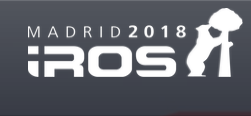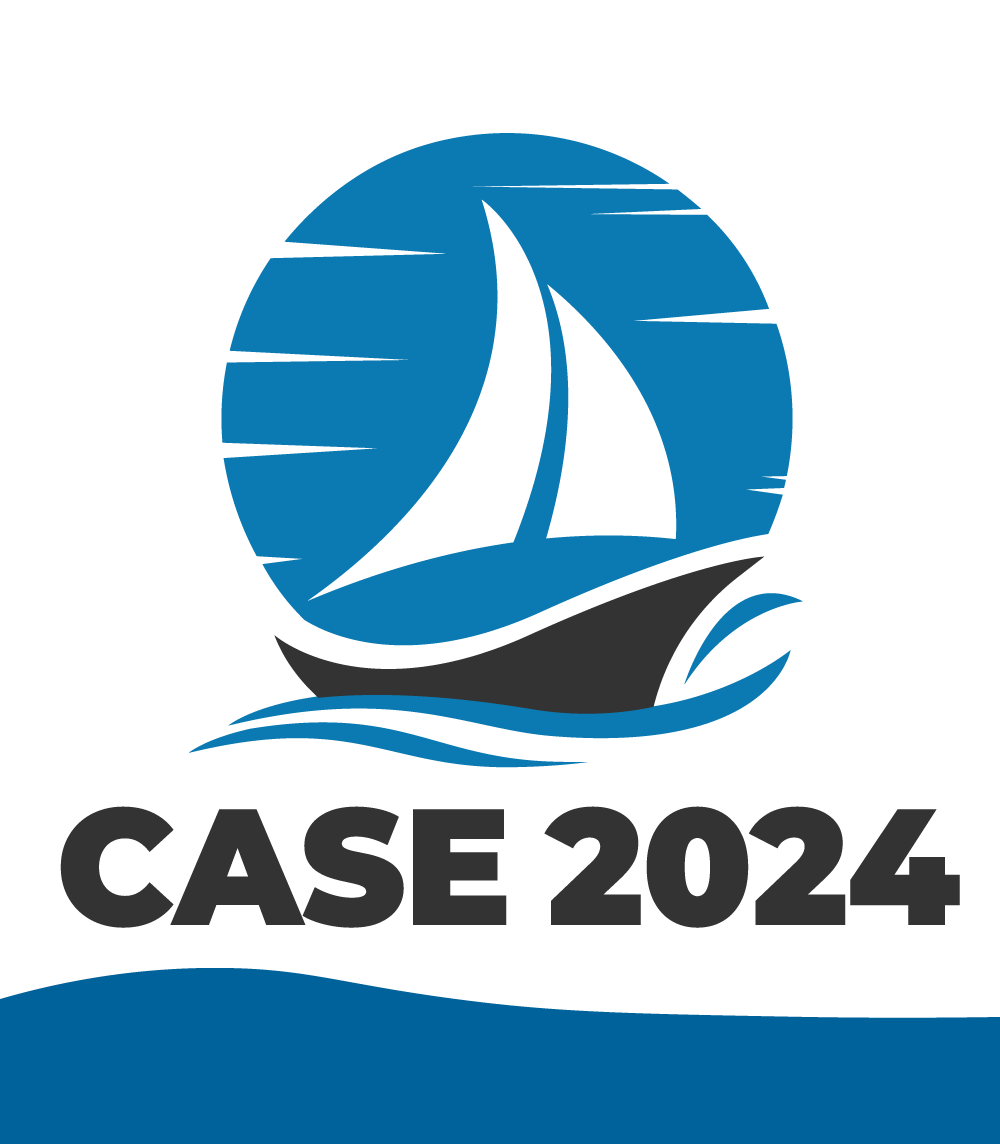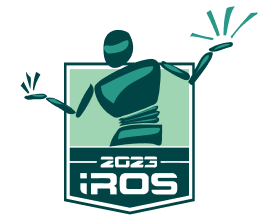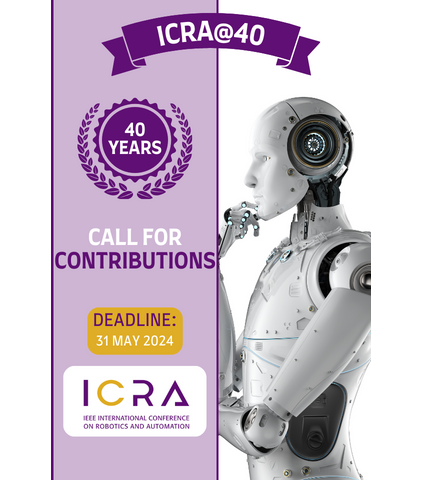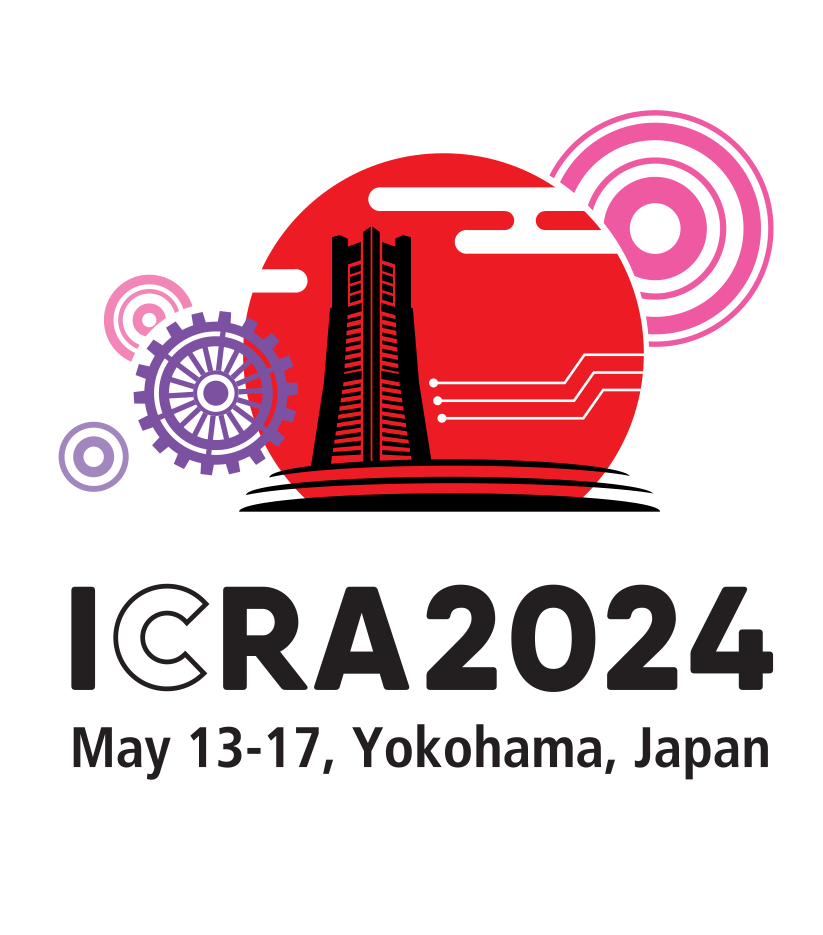Latest News
Special Issue "Continual Unsupervised Sensorimotor Learning" invites research articles.
AIM AND SCOPE
Although machine learning algorithms continue to improve at a rapid pace enabling technologies and products such as autonomous driving cars and sophisticated image and speech recognition, it is often forgotten that these applications represent tailored solutions to specific tasks. Thus it is not clear if or how these autonomous systems can pave the road to general purpose machines envisioned by many.
The pursuit for higher levels of autonomy and versatility in robotics is arguably lead by two main factors. Firstly, as we push robots out of the labs and productions lines, it becomes increasingly difficult to design for all possible scenarios that a particular robot might encounter. Secondly, the cost of designing, manufacturing, and maintaining such systems becomes prohibitive.
As the algorithms for learning single tasks in restricted environments are improving, new challenges have gained relevance in order to get more autonomous artificial systems. These challenges include multi-task learning, multimodal sensorimotor learning and lifelong adaptation to injury, growth and ageing. Addressing these challenges promise higher levels of autonomy and versatility of future robots. This special issue on Continual Unsupervised Sensorimotor Learning is primarily concerned with the developmental processes involved in unsupervised sensorimotor learning in a life-long perspective, and in particular the emergence of representations of action and perception in humans and artificial agents in continual learning. These processes include action-perception cycle, active perception, continual sensory-motor learning, environmental-driven scaffolding, and intrinsic motivation.
The special issue will highlight behavioural and neural data, and cognitive and developmental approaches to research in the areas of robotics, computer science, psychology, neuroscience, etc. Contributions might focus on mathematical and computational models to improve robot performance and/or attempt to unveil the underlying mechanisms that lead to continual adaptation to changing environment or embodiment and continual learning in open-ended environments. Contributions from multiple disciplines including cognitive systems, cognitive robotics, developmental and epigenetic robotics, autonomous and evolutionary robotics, social structures, multi-agent and artificial life systems, computational neuroscience, and developmental psychology, on theoretical, computational, application-oriented, and experimental studies as well as reviews in these areas are welcome.
THEMES
This special issue aims to report state-of-the-art approaches and recent advances on Continual Unsupervised Sensorimotor Learning with a cross-disciplinary perspective. Topics relevant to this special issue include but are not limited to:
- Emergence of representations via continual interaction
- Continual sensory-motor learning
- Action-perception cycle
- Active perception
- Environmental-driven scaffolding
- Intrinsic motivation
- Neural substrates, neural circuits and neural plasticity
- Human and animal behaviour experiments and models
- Reinforcement learning and deep reinforcement learning for life-long learning
- Multisensory robot learning
- Multimodal sensorimotor learning
- Affordance learning
- Prediction learning
SUBMISSION
Manuscripts should be prepared according to the Information for Authors of the journal found here:
https://cis.ieee.org/publications/t-cognitive-and-developmental-systems/tcds-information-for-authors
Submissions must be done through the IEEE TCDS Manuscript center:
https://mc.manuscriptcentral.com/tcds-ieee
During the submission process, please select the category SI: Continual Unsupervised Sensorimotor Learning.
IMPORTANT DATES
6 January 2019: Paper submission deadline
15 March 2019: Notification for authors
31 May 2019: Deadline revised papers submission
30 June 2019: Final notification for authors
31 July 2019: Deadline for camera-ready versions
September 2019: Expected publication date
More information on Continual Unsupervised Sensorimotor Learning:
http://projects.au.dk/socialrobotics/news-events/show/artikel/special-issue-on-continual-unsupervised-sensorimotor-learning/
GUEST EDITORS
Nicolás Navarro-Gerrero
Aarhus University, Aarhus, Denmark nng@eng.au.dk
Sao Mai Nguyen
IMT Atlantique, Francenguyensmai@gmail.com
Erhan Öztop
Özyeğin University, Turkeyerhan.oztop@ozyegin.edu.tr
Junpei Zhong
National Institute of Advanced Industrial Science and Technology (AIST), Japanjoni.zhong@aist.go.jp
Conor Walsh, 2017 Early Academic Career Award in Robotics and Automation recipient, and his Harvard team are advancing soft, wearable robots with embedded sensors for hand and arm rehabilitation.
With support from the National Science Foundation (NSF), Walsh and team are developing lightweight, soft, wearable robots that people can wear all day, every day, to help them regain use of their upper extremities. Walsh wants to shift the paradigm of rehabilitation from one where the therapist manipulates the fingers and thumb through some range of motion to one where a soft robotic glove can help the patient do the work themselves.
Read more and view the National Science Foundation video here: https://youtu.be/zgQFRJK3IK0
Announcing a New Website that showcases 200 robots from around the world to inform and excite the public about the possibilities of robotics.
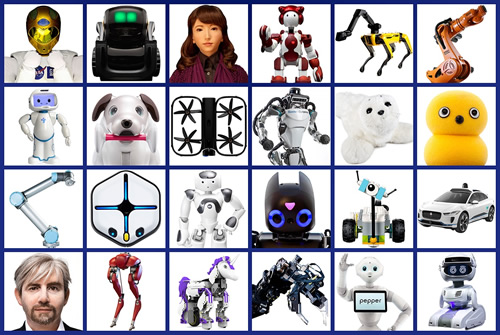
Earlier this month, IEEE launched Robots.ieee.org, an interactive guide to the amazing world of robotics. The goal is showing the public, especially young people and kids, how real-world robots work and how they can have a positive impact on society. In addition to providing some funding for this project, RAS has established a Steering Committee to advise on content and direction.
The site currently features 200 robots from 19 countries, with 360-degree views, interactive animations, and thousands of photos, videos, and technical specs for each robot. The catalog will keep expanding with new types of robots from different locations around the world.
The project is an expansion on IEEE's Robots iPad app, which has been downloaded 1.3 million times and is used in STEM programs globally. The new site aims to reach an even broader audience and become a powerful tool for STEM education as well as a valuable resource for roboticists in industry, research, and startups.
Experience the Robots website Now! https://robots.ieee.org/
CALL FOR PAPERS
IEEE TRANSACTIONS ON AUTOMATION SCIENCE AND ENGINEERING
Special Issue on Enabling Knowledge Based Smart Manufacturing Systems
Smart manufacturing is targeted as the next generation of manufacturing by many national and international strategic development. The increasingly rich production data, the integration and extensive application of information technology, and the intelligent data processing and system modeling methods have collectively enabled smart manufacturing. Building upon them, manufacturing system modeling, knowledge acquisition, design and real-time control are the key components.
The central theme of the Special Issue will be emerging opportunities and future directions in enabling knowledge based smart manufacturing systems. This special issue will focus on how the promise of smart manufacturing could be fulfilled by providing knowledge either from models before operations and/or from data during operations of manufacturing systems. The goals of the special issue are (1) to present the state-of-the-art research in science, engineering and methodologies for knowledge based automated manufacturing systems, and (2) to provide a forum for experts to disseminate their recent advances and views on future perspectives in the field.
Topics to be covered include, but are not limited to:
- Flexible, agile and customized manufacturing systems based on knowledge and learning techniques
- Knowledge based software for smart manufacturing systems
- Human-machine interaction for manufacturing automation
- Architectures and paradigms for smart manufacturing systems
- Design optimization for smart manufacturing systems
- Methods and principles for manufacturing knowledge acquisition during runtime
- Evolution of manufacturing knowledge basis for system redesign and optimization
- Performance evaluation, improvement and real-time control and scheduling of manufacturing systems
- Applications and case studies including industrial use cases
Important Dates
15 February 2019: paper submission deadline (Extended: 31 March 2019)
1 May 2019: completion of the first round review
1 September 2019: completion of the second round review
1 November 2019: final submission due
1 January 2020: tentative publication date
Guest Editors
Birgit Vogel-Heuser, Technical University of Munich, Germany, vogel-heuser@tum.de
Feng Ju, Arizona State University, USA, fengju@asu.edu
Yan Lu, National Institute of Standards and Technology, USA, yan.lu@nist.gov
Cesare Fantuzzi, University of Modena and Reggio Emilia, Italy, cesare.fantuzzi@unimore.it
Dieter Hess, 3S-Smart Solution GmbH, Germany, d.hess@codesys.com
For more information see: http://www.ieee-ras.org/publications/t-ase
Congratulations and welcome to the following newly organized IEEE Robotics and Automation Society Chapters:
Region 5
USA
- IEEE Metropolitan Los Angeles Section Systems, Man, and Cybernetics and Robotics and Automation Joint Societies Chapter
- University of Houston Robotics and Automation Society Student Branch Chapter in the Houston Section
Region 8
Norway
- Norway Section Computer, Robotics and Automation and Information Theory Joint Societies Chapter
Region 9
Argentina
- Universidad Tecnológica Nacional Facultad Regional Buenos Aires (UTN-FRBA) Robotics and Automation Society Student Branch Chapter in the Argentina Section
Brazil
- Instituto Federal de Brasilia (IFB) Robotics and Automation Society Student Branch Chapter in the Centro-Norte Brasil Section
- Universidade Estadual de Feira de Santana Robotics and Automation Society Student Branch Chapter in the Bahia Section
- Universidade Federal da Paraíba Robotics and Automation Society Student Branch Chapter in the Bahia Section
Region 10
China
- IEEE Nanjing Section Robotics and Automation Society Chapter
India
- Indian Institute of Technology-Mandi Robotics and Automation Society Student Branch Chapter in the Delhi Section
- PES Institute of Technology-Bangalore Robotics and Automation Society/Sensors Council Student Branch Chapter in the Bangalore Section
- Rajiv Gandhi Institute of Technology Robotics and Automation Society Student Branch Chapter in the Kerala Section
- S A Engineering College Robotics and Automation Society Student Branch Chapter in the Madras Section
Pakistan
- Institute of Industrial Electronics Engineering Robotics and Automation Society Student Branch Chapter in the Karachi Section
Congratulations to the IEEE Robotics and Automation Society members recently elevated to Senior Member status by the IEEE Admission and Advancement (A&A) Senior Member Review Panel.
To be eligible for application or nomination, candidates must:
- Be engineers, scientists, educators, technical executives, or originators in IEEE-designated fields
- Have experience reflecting professional maturity
- Have been in professional practice for at least ten years (with some credit for certain degrees)
- Show significant performance over a period of at least five of their years in professional practice
Nominees for IEEE Fellow must hold the grade of Senior Member or Life Senior Member in order to qualify for elevation to Fellow status.
|
Ruhizan Liza Ahmad Shauri |
Mohammad Al-Abed |
Essa Al-Suwaidi |
|
Jacopo Aleotti |
Rafael Aroca |
Shaoping Bai |
|
Richard Bearee |
Nicola Bellotto |
Janos Botzheim |
|
Darwin Caldwell |
Craig Carignan |
Marco Carricato |
|
Han-Lim Choi |
Eftychios Christoforou |
Matthew Clavelli |
|
Ashwin Dani |
Reinaldo de Bernardi |
Domenico Formica |
|
Paolo Frasca |
Luigi Freda |
Ibrahim Fahad Jasim Ghalyan |
|
Olaf Haenssler |
Tamas Haidegger |
Lafifa Jamal |
|
Gene Kern |
Lindsay Kleeman Victorian Section Monash University |
Katherine Kuchenbecker Germany Section Max Planck Institute for Intelligent Systems |
|
Alessandro Liani |
Guangcan Liu |
Weifeng Liu Norway Section Norwegian University of Science and Technology |
| Henry Medeiros Milwaukee Section Marquette University |
Juan Moreno Spain Section Cajal Institute, Spanish National Research Council (CSIC) |
Charles Phiri United Kingdom and Ireland Section University of Portsmouth |
| Mohammad Rahman Milwaukee Section University of Wisconsin-Milwaukee |
Juan Ernesto Rodriguez Coastal South Carolina Section CMD Engineering |
Juan Rojas Guangzhou Section Guangdong University of Technology |
| Dr. Daher Sayfeddine Oman Section Khatib & Alami |
Faibish Sorin Boston Section Fast Data Group at EMC |
Gabor Sziebig Norway Section UiT The Arctic University of Norway |
| Renaldas Urniezius Lithuania Section Kaunas University of Technology |
Richard Vaughan Vancouver Section Simon Fraser University |
Zhidong Wang Tokyo Section Chiba Institute of Technology |
| Hui Xie Harbin Section Ningbo Ningbo Institute of Materials Technology & Engineering |
Haibin Yu Harbin Section Shenyang Institute of Automation (SIA) |
RAS is pleased to arrange several Networking Events for our Members attending IROS 2018 in Madrid, Spain from 1-5 October 2018. Mark your calendars, and register in advance to secure a spot in these highly popular activities.
STUDENT SCAVENGER HUNT – IROS 2018

Are you a student planning to attend IROS 2018 Madrid, Spain? Join the IEEE RAS Student Activities Committee for a fun photo scavenger hunt! Teams of 2-3 students will be emailed a super top secret list of objectives on the morning of 1 October. Throughout the conference, teams will then take pictures demonstrating they achieved each objective – ranging from shaking hands with RAS leadership, visiting local sights near the conference venue, to doing funny poses. Awards will be presented to teams which found the most items and teams with the most creative photos!
Who: Students attending IROS 2018
What: A fun picture scavenger hunt
When: 1-5 October 2018
Where: IROS in Madrid, Spain
Why: Because everyone needs a little fun!
If you already know a few other students attending, you can form a Team and register as a group. If not, please register yourself, and we will team you up with other enthusiastic roboticists. See you in Madrid!!
Register here: https://app.smartsheet.com/b/form/0cb766c0756a4684a0b03d719e45f32e
NETWORKING RECEPTION: Meet the RAS Technical Committees
Tuesday, 2 October 2018 from 17:00 – 18:30
Room RESTAURANTE VIP, 4.L.3, Madrid Municipal Conference Centre, Madrid, Spain
This FREE event is open to attendees in the early stages of their career — young professionals and researchers. Chairs and Co-Chairs of the RAS Technical Committees will be available for informal conversation centered on new technologies in robotics and automation, future growth in the field, and how to get involved and contribute to RAS Technical Committee work.
Refreshments will be served! Come enjoy a snack and beverage, and meet some new colleagues!
Space is limited. Register for this FREE networking NOW! https://app.smartsheet.com/b/form/3a3a2c0493b64f81bbf3c7e11241275d
WOMEN IN ENGINEERING BREAKFAST (WiE)
Wednesday, 3 October 2018 from 8:00-10:00
Room RESTAURANTE VIP, 4.L.3, Madrid Municipal Conference Centre, Madrid, Spain
This Breakfast provides the opportunity to foster discussion on the role of women in robotics and automation, inspire girls and promote collaborations and initiatives to advance women in leadership. As the goal for this event is to be more than a lunch for women, but a lunch with women. Therefore, men are more than welcome to participate and enjoy the discussion.
Space is limited, so please register in advance! https://app.smartsheet.com/b/form/17e1c2c3940947919382b0cb185ce6ae
RAS LUNCH WITH LEADERS (LwL) – for Students
Wednesday, 3 October 2018 from 13:30-15:00
Room RESTAURANTE VIP, 4.L.3, Madrid Municipal Conference Centre, Madrid, Spain
This FREE luncheon is open to student and young professional attendees offering the chance to meet and interact with Leaders from RAS and industry. Informal discussion over lunch will take place round table style. Join us for career advice, insights into where the field is headed, or general conversation to get to know Leaders in the field of robotics and automation.
Confirmed RAS Leaders to include: Wolfram Burgard, Torsten Kroeger, Venkat Krovi, Yasushi Nakauchi, Zhidong Wang, Tony Maciejewski, Raja Chatila, Nancy Amato, Hong Zhang, Jaydev Desai …. And more…..
Space is limited, and this luncheon sells out fast! Register NOW! https://app.smartsheet.com/b/form/048cd55eb7314057a3aad7e6e143df6f
Congratulations to the following 2018 IEEE International Conference on Automation Science and Engineering (CASE) Award Recipients! Winners were announced and honored during the Awards Ceremony which took place on 22 August 2018 in Munich, Germany. Presentations made by CASE Award Chair Spyros Reveliotis.
IEEE-CASE Best Conference Paper Award
The award is given annually to the author(s) of a paper presented at the IEEE International Conference on Automation Science and Engineering (CASE) that contributed to the notable advancement in automation research: abstractions, algorithms, theory, methodologies, and models that improve efficiency, productivity, quality, and reliability of machines and systems operating in structured environments over extended periods, or that improve the explicit structuring of environments where machines and systems operate.
“Multi-Robot Routing Algorithms for Robots Operating in Vineyards”
authored by Thomas C. Thayer, Stavros Vougioukas, Ken Goldberg, and Stefano Carpin, from UC Merced, UC Davis and UC Berkeley.
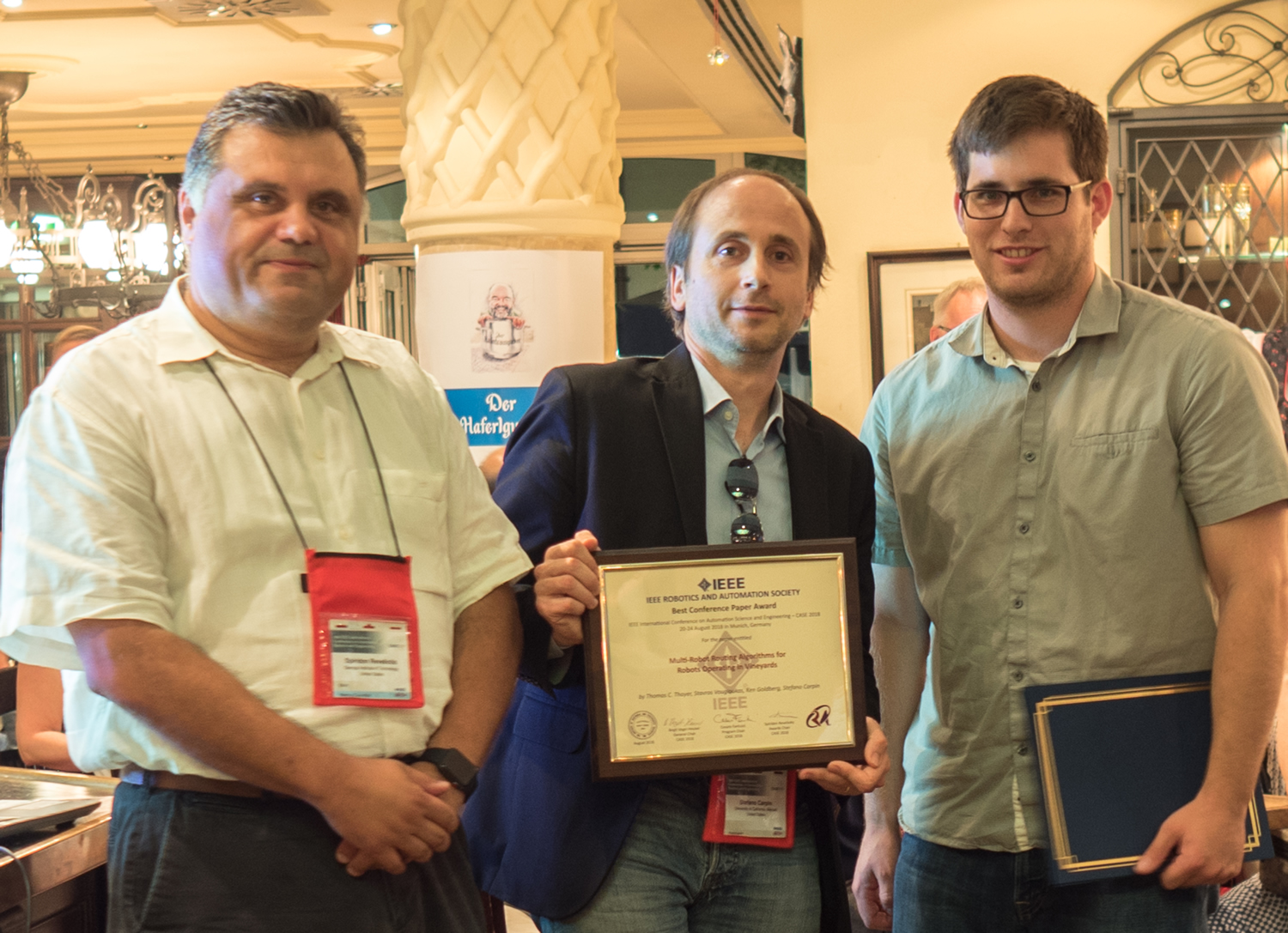
IEEE-CASE Best Application Paper Award
Best application paper presented at the International Conference on Automation Science and Engineering (CASE)
“Grasp Planning for Customizes Grippers by Iterative Surface Fitting”
authored by Yongxiang Fan, Hsien-Chung Lin, Te Tang, and Masayoshi Tomizuka from UC Berkeley
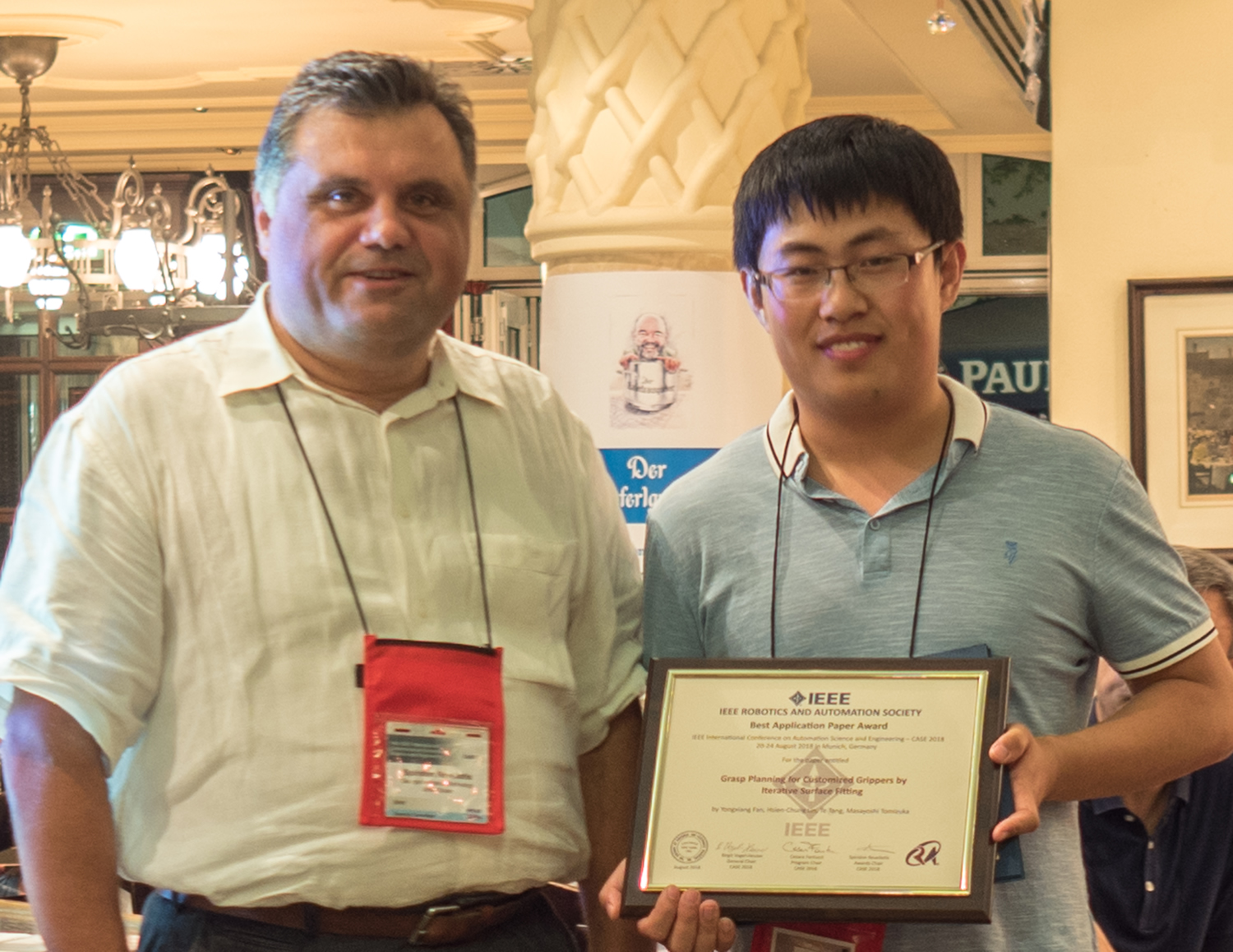
IEEE CASE Best Student Paper Award - Two Recipients this Year!
This award recognizes the best paper authored primarily by a student and presented by the student at the IEEE International Conference on Automation Science and Engineering (CASE). The award is supported by his academic family to honor Professor Yu-Chi (Larry) Ho, a Past President of the IEEE Robotics and Automation Council, which later became the IEEE Robotics and Automation Society.
“Fluids—a First-Order Lightweight Urban Intersection Driving Simulator”
authored by Hankun Zhao, Andrew Cui, Schuyler Cullen, Brian Paden, Michael Laskey, and Ken Goldberg from UC Berkeley, Samsung and MIT
“A System Architecture for Constraint-Based Robotic Assembly with CAD Information”
authored by Mathias Hauan Arbo, Yudha Prawira Pane, Erwin Aertbelien, and Wilm Decre from NTNU and Katholieke University of Leuven
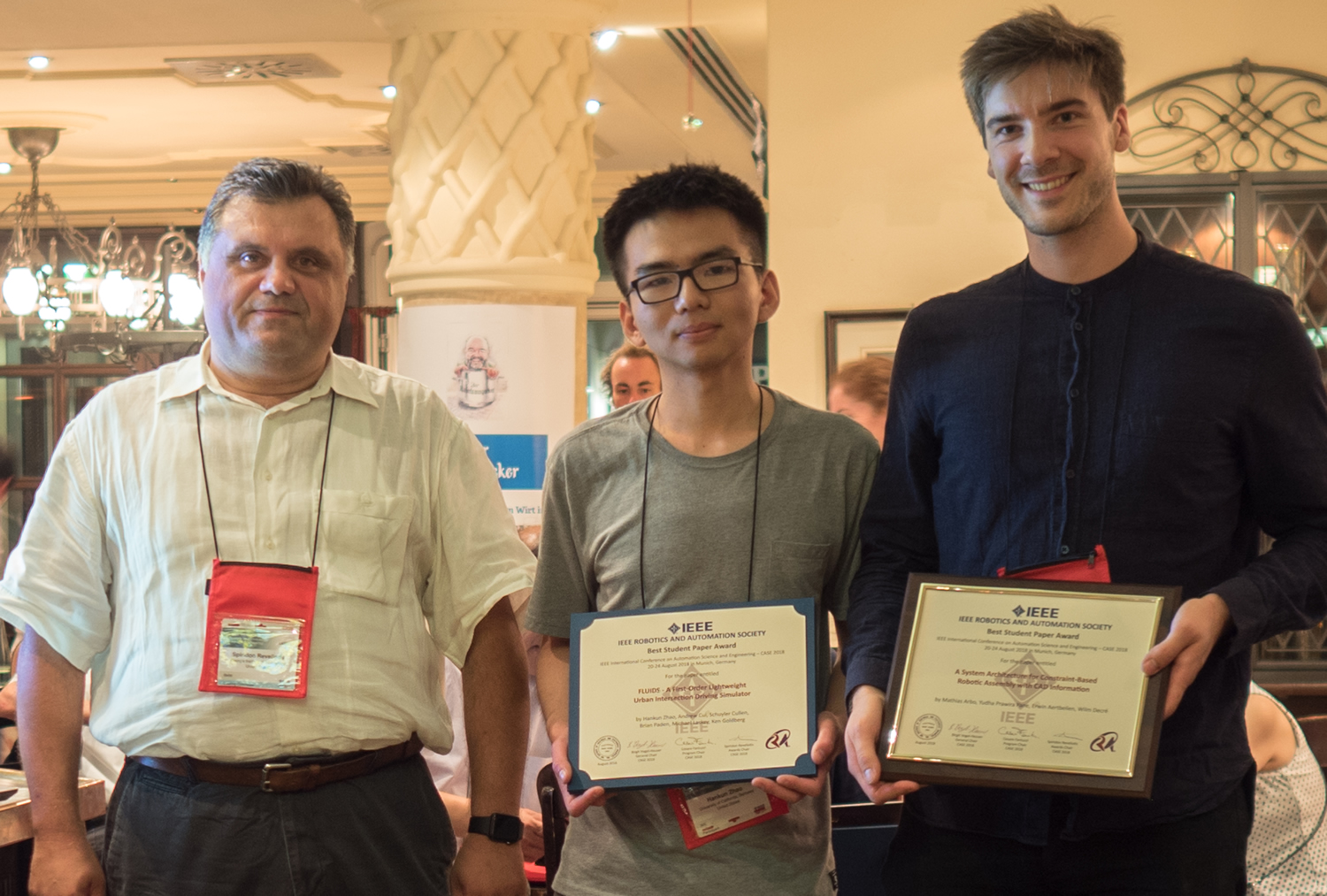
The Deadline to vote is 23 October 2018!
RAS members are voting to elect six new RAS Administrative Committee members to serve 3-year terms beginning 1 January 2019. All RAS members (Graduate Student Members and above) have received voting instructions, the biographies, and statements of the candidates by email. RAS membership must be active as of 15 August 2018 to be eligible to vote. Members who do not have valid emails registered with the IEEE or have opted not to receive e-mail from IEEE, have received their election materials by post.

Use https://eballot4.votenet.com/IEEE to access the ballot and cast your vote now. If you do not remember your password, you may retrieve it on the voter login page. Voting must be completed no later than 23 October 2018. Any returns received after this date will not be counted. The online voting site will close at 4:00 pm Eastern Time.
Candidate bios and position statements are here: http://www.ieee-ras.org/about-ras/governance/administrative-committee/2018-adcom-election-candidates
If you have any questions about the IEEE Robotics and Automation Society voting process, please contact ieee-rasvote@ieee.org or +1 732-562-3904.
Early this week, the IEEE RAS president Wolfram Burgard met with Cédric Villani, Fields Medal awardee and author of the French Strategy for Artificial Intelligence, to discuss opportunities for collaborations. He also visited INRIA and CNRS, two particularly strong institutions in France in the field of Artificial Intelligence and Robotics.
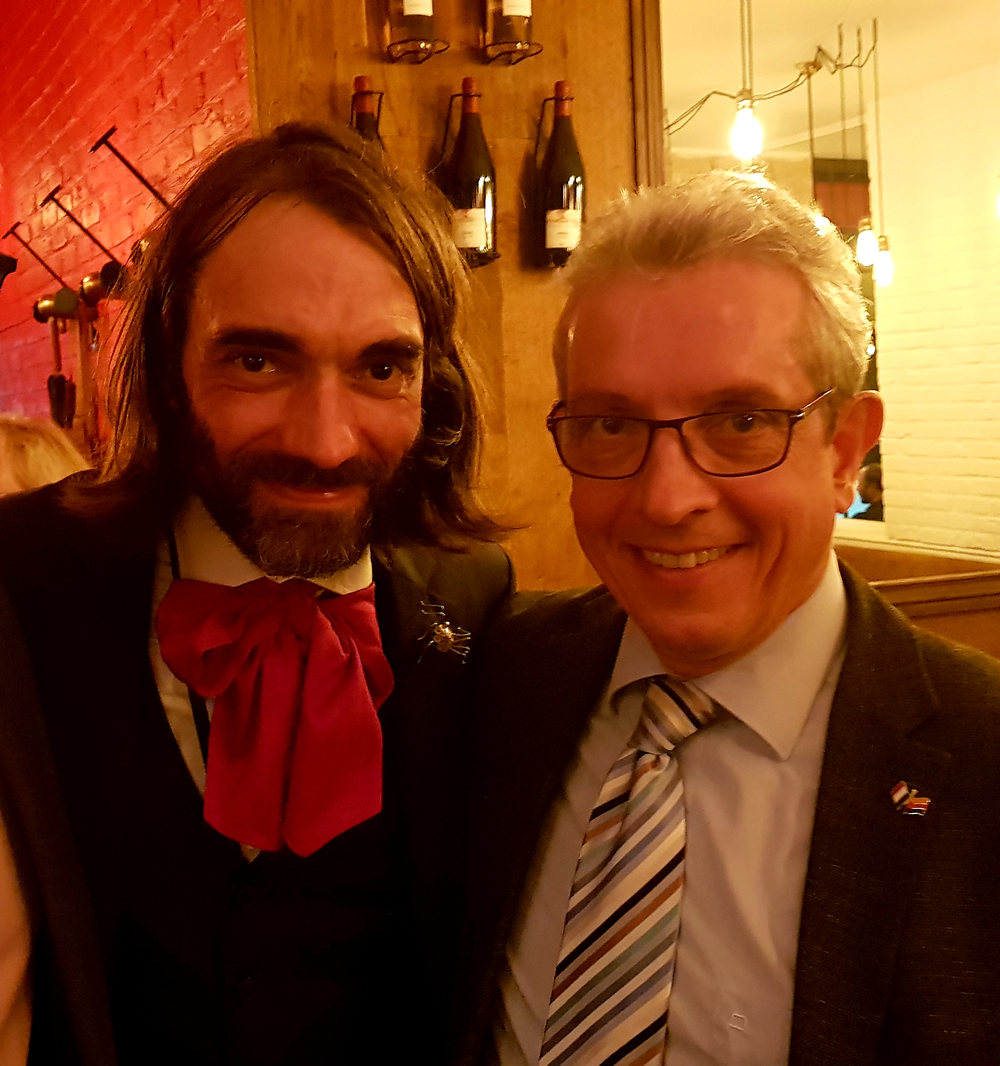
Cédric Patrice Thierry Villani is a French mathematician and politician working primarily on partial differential equations, Riemannian geometry and mathematical physics. He was awarded the Fields Medal in 2010 and he was the director of Sorbonne University's Institut Henri Poincaré from 2009 to 2017.
Villani was elected to the National Assembly, the lower house of the French Parliament, during the 2017 legislative election. A member of La République En Marche! he represents Essonne's 5th constituency. He was elected Vice President of the French Parliamentary Office for the Evaluation of Scientific and Technological Choices in July 2017.
Certain IEEE Transactions on Robotics (T-RO) paper, other than communication items and survey papers, are eligible to be presented at the upcoming IEEE International Conference on Robotics and Automation (ICRA 20xx+1), provided all of the following conditions are met:
1) the paper's final accepted manuscript is submitted to T-RO for proofing between 1 January 20xx, and 31 December 20xx;(*,**)
2) most of the key ideas of the paper have never appeared at a conference with a published proceedings (e.g., the paper is not the evolved version of a previous conference paper); and
3) at least one author of the T-RO paper commits to registering for and presenting the paper at ICRA 20xx+1, satisfying all the registration and presentation requirements for ICRA 20xx+1.
In December of 20xx, authors of eligible papers will be contacted by email by the T-RO Editor-in-Chief’s office to determine interest in presenting at ICRA 20xx+1.
(*) Authors may not request any acceleration or delay of the review process based on this criterion.
(**) For ICRA 2019 only, the date criterion is also met by T-RO papers that were published online or in an issue during the period 1 January 2018 to 31 December 2018.
BACKGROUND
Historically papers in the IEEE Transactions on Robotics have been either "evolutionary" papers (papers extended, with new results, from previously presented conference papers by the same authors) or "new" papers (papers that are not evolved from conference papers). Since the introduction of the Robotics and Automation Letters (RA-L), the robotics community has demonstrated strong support for straight-to-journal papers (maximum of eight pages) with the possibility of presentation at a conference.
This new IEEE RAS T-RO-to-ICRA policy, formalizing pilots of the policy at ICRA 2017 and 2018, provides a conference presentation option for "new" T-RO papers. Authors are no longer forced to write two versions of the paper (a short one for conference presentation and a longer one for the "final" journal version) if they want the work both to be presented at a conference and to appear in a journal. This saves on author and reviewer effort, eliminates the confusion over which paper to cite, and reduces the stress on authors and reviewers arising due to a single submission deadline for ICRA. The new policy gives a new benefit to T-RO authors and brings high-quality T-RO papers to ICRA without harming the traditional evolutionary model.
RAS is pleased to arrange a Student Scavenger Hunt and two Luncheon Networking Events for our Members attending the 14th IEEE International Conference on Automation Science and Engineering (CASE) in Munich, Germany. Space is limited for these popular events. Don’t miss the chance to attend either or both because the space has been filled.
Photo Scavenger Hunt

Are you a student planning to attend CASE 2018 in Munich, Germany? Join the IEEE RAS Student Activities Committee for a fun scavenger hunt! Teams of 2-3 students will be emailed a super top secret list of objectives on the morning of 20 August. Throughout the conference, teams will then take pictures demonstrating they achieved each objective - ranging from shaking hands with RAS leadership, visiting local sights near the conference venue, to doing funny poses. Awards will be presented to teams which found the most items and teams with the most creative photos!
Who: Students attending CASE 2018
What: A fun picture scavenger hunt
When: 20-23 August 2018
Where: CASE in Munich
Why: Because everyone needs a little fun!
If you already know a few other students attending, you can form a Team and register as a group. If not, please register yourself, and we will team you up with other enthusiastic roboticists. See you in Munich!
Register here: https://app.smartsheet.com/b/form/0cb766c0756a4684a0b03d719e45f32e
RAS Women In Engineering (WIE) Luncheon
Tuesday, 21 August 2018
12:45-2:15 in Room MW 2250
Technical University of Munich, Campus Garching
Munich, Germany
The WiE luncheon provides the opportunity to foster discussion on the role of women in robotics and automation, inspire girls and promote collaborations and initiatives to advance women in leadership. As the goal for this event is to be more than a lunch for women, but a lunch with women. Therefore, men are more than welcome to participate and enjoy the discussion.
The Luncheon is FREE to attendees, but you MUST be registered in advance.
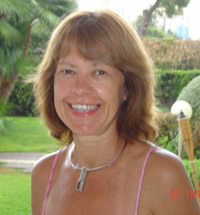
SPEAKER:
Maria Pia Fanti (IEEE Fellow) received the Laurea degree in electronic engineering from the University of Pisa, Pisa, Italy, in 1983. She was a visiting researcher at the Rensselaer Polytechnic Institute of Troy, New York, in 1999. Since 1983, she has been with the Department of Electrical and Information Engineering of the Polytechnic of Bari, Italy, where she is currently a Full Professor of system and control engineering and Chair of the Laboratory of Automation and Control. Her research interests include discrete-event systems; Petri net; consensus protocols; fault detection; management and modeling of complex systems, such as production systems, logistic and healthcare systems.
Prof. Fanti was General Chair of the 2011 IEEE Conference on Automation Science and Engineering and of the IFAC Workshop on Dependable Control of Discrete Systems 2009. She is Editor of the IEEE Trans. on Automation Science and Engineering and Associate Editor of the IEEE Trans. on Systems, Man, and Cybernetics: Systems. She is member at large of the Board of Governors of the IEEE SMC Society, Co-Chair of the Technical committee on Discrete Event Systems of the IEEE SMC Society, and of the Technical Committee on Automation in Logistics of the IEEE Robotics and Automation Society.
RAS Lunch with Leaders (LwL) for Students and Young Professionals
Wednesday, 22 August 2018
12:00-1:30 in room MW2250
Technical University of Munich, Campus Garching
Munich, Germany
This luncheon is open to student and young professional attendees. The Luncheon offers the chance to meet and interact with Leaders from RAS and industry. Informal discussion over lunch will take place round table style. Join us for career advice, insights into where the field is headed, or general conversation to get to know Leaders in the field of robotics & automation.
The Luncheon is FREE to attendees, but you MUST be registered in advance.
Confirmed Leaders include: Fan-Tien Cheng, Maria Pia Fanti, Cesare Fantuzzi, George Q. Huang, Qing-Shan (Samuel) Jia, Feng Ju, Bengt Lennartson, Peter Luh, Xin Luo, Dan Popa, Kazuhiro Saitou, Weiming Shen, Jie Song, Michael Yu Wang, Xiaolan Xie, Qianchuan Zhao, Mengchu Zhou
IEEE TechEthics Conversations Series
Live Broadcast: Tuesday, 7 August 2018
Time: 12:00 pm - 1:00 pm EDT (GMT -4)
From as far back as Ancient Egypt in 1500 B.C., humans have explored ways to regain functionality due to limb loss. In the more than three millennia since then, the evolution of augmentation has taken us well beyond simply regaining functionality to exceeding it. Join us as a panel of experts and visionaries discuss how advancements in limb prosthetics are helping to shape what it means to be human.
SPEAKERS
Angel Giuffria | Bionic Actress, Congenital Amputee
Oleg Pianykh | Head of Foot Development and Project Management, Otto Bock Healthcare LP
Laura Specker Sullivan | Assistant Professor of Philosophy, College of Charleston
Mark A. Vasquez | IEEE TechEthics Program Manager (moderator)
More information HERE
Register NOW for this webinar:
https://docs.google.com/forms/d/e/1FAIpQLSdD7qcXWwCl8JjI_voD4-STNytbCYlBB4D5HT7xDQ0tFe89gg/formResponse
Haptically Controlled Robots Will Take On Tasks Too Dangerous for Humans. With its sense of touch, Stanford’s OceanOne android can assist with recovery efforts on sea and land.
A diving android invented by IEEE and RAS Life Fellow Oussama Khatib could someday take over jobs too dangerous for humans. OceanOne was built at Stanford where Khatib is a professor of computer science.
Read the FULL article here
The IEEE Trans. on Automation Science and Engineering (T-ASE, http://www.ieee-ras.org/publications/t-ase) is soliciting nominations for multiple Editors and Associate Editors, with a term beginning January 2019. Editors and Associate Editors play important roles in ensuring the quality of publications and in guiding the general development of the Transactions, in multiple capacities including implementing reviews of manuscripts according to IEEE guidelines, soliciting emerging topical articles for special issues, guiding the overall direction of the publication, and providing feedback from the readership. Active participations are expected in the annual IEEE Conference on Automation Science and Engineering (IEEE CASE) and in at least one of the two editorial board meetings held annually in conjunction with the IEEE International Conference on Robotics & Automation (ICRA) and IEEE CASE.
The term of an Editor or Associate Editor normally consists of a one-year probation period followed by four years (for Editor) or two years (for Associate Editor) of additional service if performance is satisfactory. Candidates should have a strong technical background in T-ASE related areas and excellent English language skills. Previous publications in T-ASE and participations in IEEE CASE are strongly preferred.
Nominations should include a resume (not to exceed three pages), a complete list of journal publications, previous experience with publications as a reviewer or in editorial capacities, and areas of technical expertise. Please submit nominations in a single pdf file to Antonia Carl at a.carl@ieee.org, by 1 October 2018.
Congratulations and welcome to the following newly organized IEEE Robotics and Automation Society Chapters.
Region 7
Canada
- University of Calgary Robotics and Automation and Computer Joint Societies Student Branch Chapter
Region 8
Greece
- Technological Educational Institute (TEI) of Central Macedonia Robotics and Automation Society Student Branch
Romania
- Romania Section Robotics and Automation Society Chapter
Spain
- University of Alicante Robotics and Automation Society Student Branch Chapter
United Arab Emirates
- United Arab Emirates Section Joint Chapter, Engineering in Medicine and Biology/Computer/Robotics and Automation Societies
Tunisia
- Ecole Nationale D'Ingenieurs De Tunis Robotics and Automation and Sensors Council Joint Societies Student Branch Chapter
- National School of Electronics and Telecommunications (ENET'Com) Robotics and Automation Society Student Branch Chapter
Region 9
Argentina
- Universidad Tecnológica Nacional - Facultad Regional Tucumán (FRT) Robotics and Automation Society Student Branch Chapter
Bolivia
- Bolivian Catholic University - Cochabamba Robotics and Automation Society Student Branch Chapter
Colombia
- Institución Universitaria CESMAG, (Centro de Estudios Superiores María Goretti) Robotics and Automation Society Student Branch Chapter
- Universidad Distrital Francisco José de Caldas Robotics and Automation Society Student Branch Chapter
- Universidad Santiago de Cali Robotics and Automation Society Student Branch Chapter
El Salvador
- Universidad de el Salvador Robotics and Automation Society Student Branch Chapter
Nicaragua
- Universidad Nacional de Ingeniería Robotics and Automation Society Student Branch Chapter
Peru
- Universidad San Ignacio De Loyola (USIL) Robotics and Automation Society Student Branch Chapter
Region 10
Bangladesh
- University of Dhaka Robotics and Automation Society Student Branch Chapter
India
- Kongunadu College of Engineering and Technology Robotics and Automation Society Student Branch Chapter
Pakistan
- COMSATS Institute of Information Technology, Islamabad Robotics and Automation Society Student Branch Chapter
- COMSATS Institute of Information Technology, Lahore Robotics and Automation Society Student Branch Chapter
- University of South Asia Robotics and Automation Society Student Branch Chapter
The United Nations announced it has launched a high-level panel on digital cooperation, co-chaired by Melinda Gates (wife of Bill Gates of software titan Microsoft), and Jack Ma, head of China’s e-commerce titan Alibaba Group. The 20-member panel will “identify policy, research and information gaps, and make proposals to strengthen international cooperation in the digital space.”
RAS is pleased to have the field of robotics & automation represented through the expertise of member Edson Prestes.
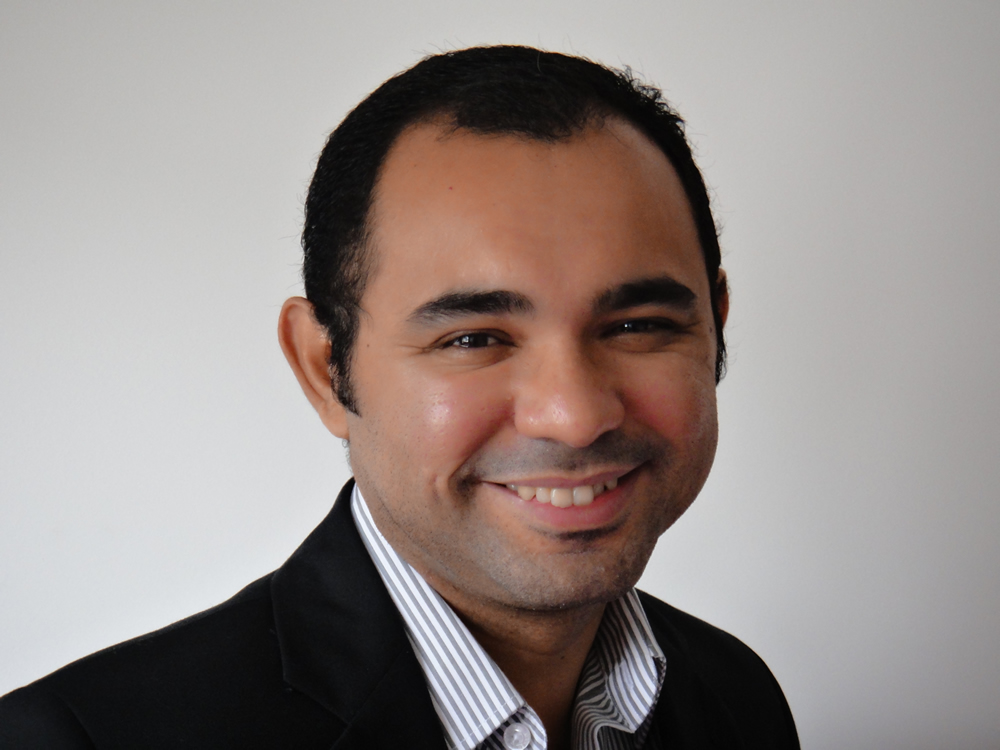
Read the full Press Release here: https://www.un.org/en/digital-cooperation-panel/
Congratulations to the IEEE Robotics and Automation Society members recently elevated to Senior Member status by the IEEE Admission and Advancement (A&A) Senior Member Review Panel.
- To be eligible for application or nomination, candidates must:
- Be engineers, scientists, educators, technical executives, or originators in IEEE-designated fields
- Have experience reflecting professional maturity
- Have been in professional practice for at least ten years (with some credit for certain degrees)
- Show significant performance over a period of at least five of their years in professional practice
Nominees for IEEE Fellow must hold the grade of Senior Member or Life Senior Member in order to qualify for elevation to Fellow status.
|
Lafifa Jamal |
Hui Xie |
Haibin Yu |
|
Guangcan Liu |
Zhidong Wang |
Ashwin Dani |
|
Gene Kern |
Craig Carignan |
Richard Vaughan |
|
Eftychios Christoforou |
Richard Bearee |
Paolo Frasca |
|
Katherine Kuchenbecker |
Olaf Haenssler |
Luigi Freda |
|
Marco Carricato |
Mohammad Al-Abed |
Gabor Sziebig |
|
Weifeng Liu |
Dr. Daher Sayfeddine |
Juan Moreno |
|
Charles Phiri |
Rafael Aroca |
Ibrahim Fahad Jasim Ghalyan |
|
Domenico Formica |
Congratulations to the IEEE Robotics and Automation Society members recently elevated to Senior Member status by the IEEE Admission and Advancement (A&A) Senior Member Review Panel.
To be eligible for application or nomination, candidates must:
- Be engineers, scientists, educators, technical executives, or originators in IEEE-designated fields
- Have experience reflecting professional maturity
- Have been in professional practice for at least ten years (with some credit for certain degrees)
- Show significant performance over a period of at least five of their years in professional practice
Nominees for IEEE Fellow must hold the grade of Senior Member or Life Senior Member in order to qualify for elevation to Fellow status.
|
Ruhizan Liza Ahmad Shauri |
Mohammad Al-Abed |
Essa Al-Suwaidi |
|
Jacopo Aleotti |
Rafael Aroca |
Shaoping Bai |
|
Richard Bearee |
Nicola Bellotto |
Janos Botzheim |
|
Darwin Caldwell |
Craig Carignan |
Marco Carricato |
|
Han-Lim Choi |
Eftychios Christoforou |
Matthew Clavelli |
|
Ashwin Dani |
Reinaldo de Bernardi |
Domenico Formica |
|
Paolo Frasca |
Luigi Freda |
Ibrahim Fahad Jasim Ghalyan |
|
Olaf Haenssler |
Tamas Haidegger |
Lafifa Jamal |
|
Gene Kern |
Lindsay Kleeman Victorian Section Monash University |
Katherine Kuchenbecker Germany Section Max Planck Institute for Intelligent Systems |
|
Alessandro Liani |
Guangcan Liu |
Weifeng Liu Norway Section Norwegian University of Science and Technology |
| Henry Medeiros Milwaukee Section Marquette University |
Juan Moreno Spain Section Cajal Institute, Spanish National Research Council (CSIC) |
Charles Phiri United Kingdom and Ireland Section University of Portsmouth |
| Mohammad Rahman Milwaukee Section University of Wisconsin-Milwaukee |
Juan Ernesto Rodriguez Coastal South Carolina Section CMD Engineering |
Juan Rojas Guangzhou Section Guangdong University of Technology |
| Dr. Daher Sayfeddine Oman Section Khatib & Alami |
Faibish Sorin Boston Section Fast Data Group at EMC |
Gabor Sziebig Norway Section UiT The Arctic University of Norway |
| Renaldas Urniezius Lithuania Section Kaunas University of Technology |
Richard Vaughan Vancouver Section Simon Fraser University |
Zhidong Wang Tokyo Section Chiba Institute of Technology |
| Hui Xie Harbin Section Ningbo Ningbo Institute of Materials Technology & Engineering |
Haibin Yu Harbin Section Shenyang Institute of Automation (SIA) |
IEEE - RAS Congratulates Recently Elevated Senior Members
Congratulations to the IEEE Robotics and Automation Society members recently elevated to Senior Member status by the IEEE Admission and Advancement (A&A) Senior Member Review Panel.
- To be eligible for application or nomination, candidates must:
- Be engineers, scientists, educators, technical executives, or originators in IEEE-designated fields
- Have experience reflecting professional maturity
- Have been in professional practice for at least ten years (with some credit for certain degrees)
- Show significant performance over a period of at least five of their years in professional practice
Nominees for IEEE Fellow must hold the grade of Senior Member or Life Senior Member in order to qualify for elevation to Fellow status.
|
Marcelo Ang |
Thomas Bak |
Richard Byrne |
|
Nevin Darwish |
Marcio De Queiroz |
Thomas Doney |
|
David Elata |
Ponciano Escamilla-Ambrosio |
Peng Fang |
|
Aleksandra Faust |
Sami Hajjaj |
Marco Huber |
|
Jan-Erik Kallhammer |
Jens Kober |
Kolja Kuehnlenz |
|
Dong Soo Kwon |
Mihai Micea |
Rajesh Panakala |
|
Md Mozasser Rahman |
David Reinkensmeyer |
Daniel Roesler |
|
Muhammad Salehuddin |
Hitesh Shrimali |
Asgeir Sorensen |
|
Jun Ueda |
Gentiane Venture Tokyo Section Tokyo University of Agriculture and Technology Campus |
Matthew Walter Chicago Section Toyota Technological Institute at Chicago |
|
Xiufen Ye |


